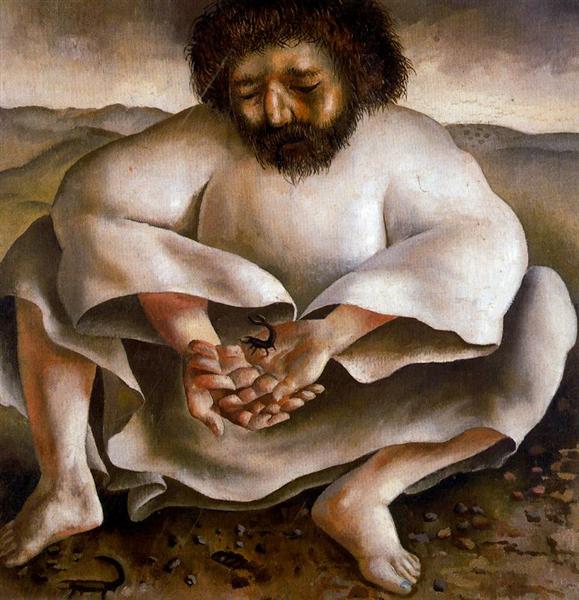Note: If you wish to receive, via e-mail, (1) my weekly newsletter or (2) daily copies of these posts, notify me at rrbates1951 at gmail dot com and I will send it/them to you. I promise not to share your e-mail address with anyone. To unsubscribe, send me a follow-up email.
Ash Wednesday
Today is the first day of Lent, during which time Christians are called to reflect in ways similar to Christ’s 40-day desert meditation. In T. S. Eliot’s “Ash Wednesday” (1930), we see the poet’s own meditation, in which he takes the despair expressed in “The Hollow Men” (1925) and other early poems and turns it upside down. Eliot fulfills the purpose of Lent by coming to see his despair, not as the end of hope, but as the starting point of faith.
Such a change does not come easy however, as the struggle for salvation comes only after a momentous struggle. As one C. E. Chaffin writes in a clarifying essay on the poem,
In AW Eliot’s poetic persona has somehow found the courage, through spiritual exhaustion, to seek faith. That faith requires of him complete submission, including the admission that faith must ultimately come from without because the “within” is exhausted.
That makes “Ash Wednesday” a very appropriate Lenten poem. Lent is that season that calls upon us to burn away the dross so that we can find the gold. That is the purpose behind Lenten disciplines.
In today’s post I examine the first section of “Ash Wednesday,” where the poet compares himself to a couple of suffering lovers, the 15th century Italian poet Guido Calvacanti and Shakespeare’s sonneteer. After acknowledging his suffering, Eliot then concludes that such suffering is a good opportunity to pare away distraction and begin to build a relationship with God.
“Because I do not hope to turn again” appears in a Calvacanti poem where a poet who is dying tells his love he will not see her again. “Desiring this man’s gift and that man’s scope,” meanwhile, is from Shakespeare’s sonnet 29, which opens in a state of despair:
When, in disgrace with fortune and men’s eyes,
I all alone beweep my outcast state,
And trouble deaf heaven with my bootless cries,
And look upon myself, and curse my fate,
Wishing me like to one more rich in hope,
Featur’d like him, like him with friends possess’d,
Desiring this man’s art and that man’s scope,
With what I most enjoy contented least…
Shakespeare’s sonnet dramatically turns around, just as Eliot himself turning around because of his faith in God . The sonnet concludes,
Yet in these thoughts my self almost despising,
Haply I think on thee, and then my state,
Like to the lark at break of day arising
From sullen earth, sings hymns at heaven’s gate;
For thy sweet love remembered such wealth brings
That then I scorn to change my state with kings.
As I said, such a shift does not come easy to Eliot. “Why should the aged eagle stretch its wings?” he asks at one point and then acknowledges that our former wings have become “merely vans to beat the air.” We can no longer recover the “vanished power of the usual reign.”
But rather than despairing in this powerlessness as he does in “The Hollow Men,” Eliot thanks the suffering for pointing him towards the divine. Once we fully realize that we cannot “turn again” and that the world is transitory and limited—when we have hit rock bottom, in other words—then we can “rejoice, having to construct something/ Upon which to rejoice.”
Eliot sounds Buddhist when he asks God to “teach us to care and not to care,” which I read as a request for instruction in how to be compassionate even as we give up our old desires. Because we thrash around in our discontent, Eliot wants God to “teach us to sit still.” Once we do so, then we can sincerely call out the words of the “Hail Mary” prayer: “Pray for us sinners now and at the hour of our death.”
Achieving a state where we can truly listen and pray–that is what Lent is all about.
Ash Wednesday
By T. S. Eliot
I
Because I do not hope to turn again
Because I do not hope
Because I do not hope to turn
Desiring this man’s gift and that man’s scope
I no longer strive to strive towards such things
(Why should the aged eagle stretch its wings?)
Why should I mourn
The vanished power of the usual reign?Because I do not hope to know again
The infirm glory of the positive hour
Because I do not think
Because I know I shall not know
The one veritable transitory power
Because I cannot drink
There, where trees flower, and springs flow, for there is nothing againBecause I know that time is always time
And place is always and only place
And what is actual is actual only for one time
And only for one place
I rejoice that things are as they are and
I renounce the blessed face
And renounce the voice
Because I cannot hope to turn again
Consequently I rejoice, having to construct something
Upon which to rejoiceAnd pray to God to have mercy upon us
And pray that I may forget
These matters that with myself I too much discuss
Too much explain
Because I do not hope to turn again
Let these words answer
For what is done, not to be done again
May the judgement not be too heavy upon usBecause these wings are no longer wings to fly
But merely vans to beat the air
The air which is now thoroughly small and dry
Smaller and dryer than the will
Teach us to care and not to care
Teach us to sit still.Pray for us sinners now and at the hour of our death
Pray for us now and at the hour of our death.


